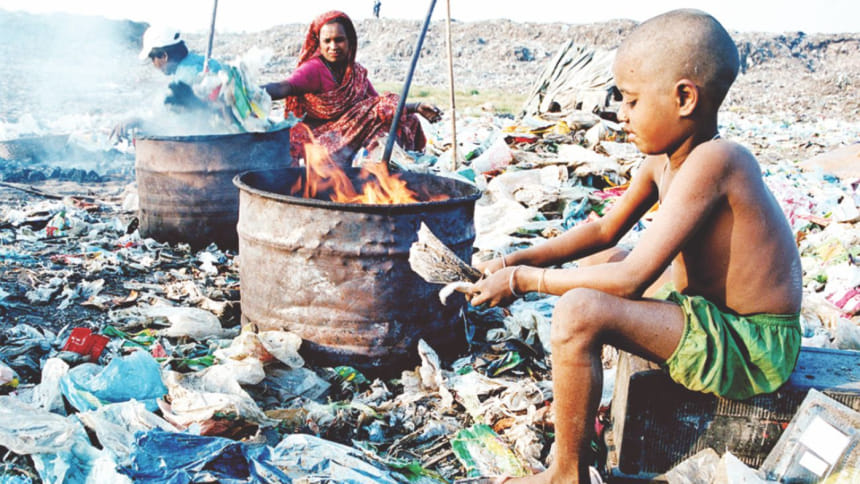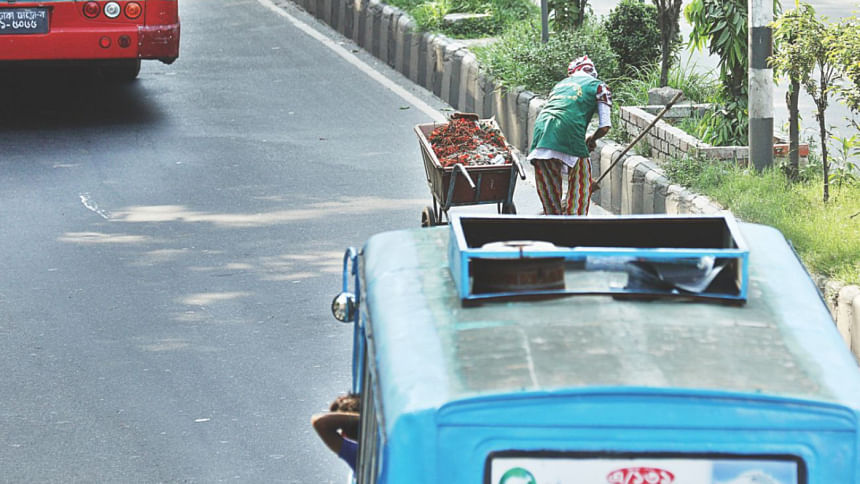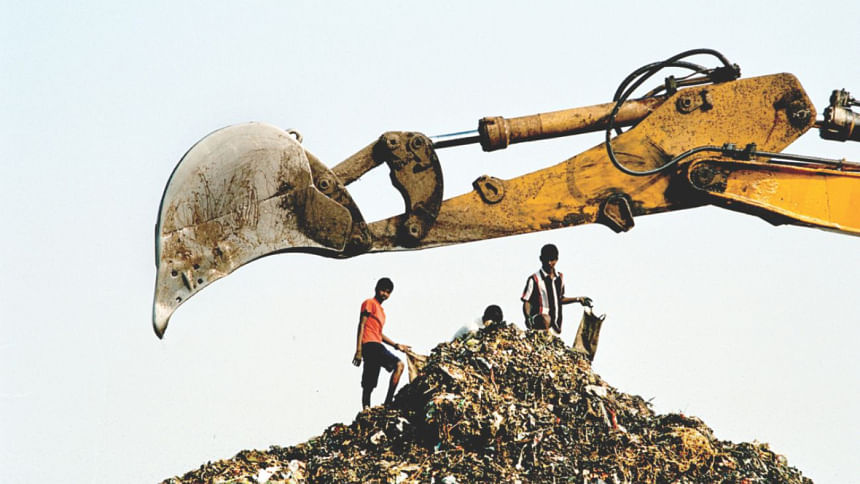There has to be a better way!

It was possibly the most awe-inspiring scene Dhaka's citizens had ever seen. Mayoral candidates, followed by a retinue of photojournalists and fans, were sweeping Dhaka's streets with brooms and emptying the dirt into trashcans. They had declared, during the lively city corporation elections, that cleaning up Dhaka and making the city healthy and hygienic will be one of their first priorities. The reality, however, is much less rosy. The desperate condition of Dhaka's waste management system is a daunting challenge and the elected mayors have a long way to go to fulfil their promise.

Dhaka, a megacity of 180 million people, generates a mass of 4,700 tonnes of waste every day. Dhaka South and North City Corporations with their poorly trained manpower of only 7739 cleaners, sweepers and related workers have been struggling to manage this humungous job with their limited resources and rudimentary technology. Due to this scarcity, the city corporations depend almost entirely on the manual labour of these several thousand dedicated workers who have no modern equipment and are extremely underpaid. The worst part is that their children are also widely engaged in garbage collection and disposal process in many areas of the city. As a result, Dhaka city's waste management system has been causing a humanitarian disaster in the country.
Hassan, Shuman and Rony, three young boys of around 15 years of age, collect domestic waste and dump it into the garbage containers of the city corporation. Hassan takes his rickshaw-van to every building of Mohammadpur-Shekhertek area of Dhaka. Shuman and Rony collect the garbage from apartments, throw them into the vans and finally empty the carriage into the nearby garbage container. These three boys, when they are supposed to go to school, are engaged in this tedious work only for a daily allowance of Tk 100.

After collecting garbage from every household, they pile it up with their bare hands and scavenge for plastic bottles, damaged electronic gadgets etc which they sell to the local buyers and earn some extra cash for their families who live in nearby slums.
Like these three, there are around thousands of children in the city who are involved in domestic garbage collection. According to the city corporation officials they are called 'Primary Collection Service Providers'. However, they are not employed or managed by the city corporations. Rafique Hasan, a waste management officer of Dhaka North City Corporation (DNCC), says, “We have set up garbage containers in specified places as it is not possible for us to collect domestic garbage from every household. Local residents of many areas of Dhaka have arranged these services that collect garbage from household and dump it into the containers. These are entirely private initiatives.”
However, the utility of these garbage containers rely primarily on these untrained young kids who carry the domestic garbage to them. DNCC has only 199 garbage containers of different sizes in 82.4 square kilometres of its jurisdiction and Dhaka South City Corporation has only 321 containers. Since the City Corporations could not set up containers in many areas, the collected waste is dumped in the open air garbage pits.

Rafiq says, “Very few people are concerned about maintaining the city's cleanliness. They throw away garbage here and there.”
“I have repeatedly requested the citizens of my jurisdiction to bring an end to this bad practice. But it seems they actually don't care” he says.
Every morning, these few thousand sweepers of city corporations sweep the city streets and gather waste to the nearby garbage dumps. With a broom and a pushcart, each of them has to sweep several kilometres of road every day. Hosne Ara, a young woman around 25, covers the street from Shahbag to Shegunbagicha of the capital with her broom and pushcart.
“Every day I start sweeping the street at 4 am and finish up at 12 pm,” she says. After 7 am it becomes very difficult to continue my work as it is one of the busiest streets of Dhaka.
“Buses, cars and all kinds of vehicles pass by me with great speed. I might be killed by one of them any day,” says a worried Hosne Ara.
On the ground around the same time, a band of cleaners reach the garbage containers usually by open trucks with their basic equipment: a shovel and a basket. None of them wear any kind of protecting clothing. Samiruddin and his team of five cleaners work at an open air garbage pit in Farmgate. They rummage through the garbage with bare hands, fill their baskets and load the five-ton truck bit by bit. Their team leader Samiruddin says, “Our officers have given us jackets which are made of plastic. It's too hot to wear those plastic jackets. Again, we have to carry heavy loads of garbage to fill the truck. Most of the jackets get torn apart within a few days.”
They have no protective gloves either. Jahir, a team mate of Samiruddin, shows his hands and legs full of scars and sores. He says, “While rummaging through garbage, my hands have been wounded many times by sharp materials like glass, steel blades etc.
“The sores you see on my body are very common among the cleaners. It is a kind of skin disease we have contracted from garbage,” Jahir says.
The scenario is even worse in the areas adjacent to government hospitals especially Dhaka Medical College Hospital. Although Prism Foundation, a non-government organisation, has been assigned by the city corporation to collect medical waste from all the hospitals of the city, garbage containers around the hospitals can be seen filled with medical wastes. Scavengers also collect different things from those lethal wastes. Many of them are addicts who scavenge for used syringes which they use to inject lethal drugs into their body, running the risk of contracting deadly diseases.
All the collected wastes from all parts of Dhaka are finally dumped into the only landfill of Matuail, an open field of 100 acres. Chief waste management officer of Dhaka South City Corporation (DSCC) Captain Raquib Uddin (TAS), psc, BN says, “One of our primary challenges is that we need to find a sustainable solution for waste disposal. We shall be able to use the landfill of Matuail at most for two more years. However, dumping all the wastes into an open field is not at all a sustainable solution where we have a severe land crisis. So, we need to find out a sustainable alternative after 2017 on urgent basis.”
Emphasising on waste reduction, Captain Raquib adds, “We throw away many things which are not garbage at all. People should be made conscious of recycling and reusing different materials. The way Dhaka is growing bigger and bigger there is no alternative of reducing, reusing and recycling garbage.”
According to Captain Bipan Kumar Saha, PSC, BN, chief waste management officer of DNCC, 600 tons of solid wastes out of 1600 collected from DNCC area are being recycled every day. Despite this the recycling industry is still not that popular in Bangladesh and a huge part of this recycling process is actually done by unprofessional and unskilled labourers.
The subhuman living conditions of waste management workers, moreover, is a major cause behind Dhaka's dilapidated waste management system. All the sweepers and cleaners of Dhaka city are crammed into shabby quarters. The most miserable are the cleaners and sweepers belonging to Telegu community who live in the sweepers' colony of the capital's Ganaktuli area. In the colony, more than 400 families live in barrack style dilapidated buildings. In a 10 by 10 feet room, 23 members of a single family pass their days and nights. One of the buildings is in such a ramshackle state that it can collapse any time. However, no step has been taken yet to rehabilitate these people. But the fact is, everyday these workers are constantly risking their lives clean to Dhaka as best as they can.
Improving Dhaka's inefficient waste management system is a big challenge. Nonetheless it is an issue which has to be addressed immediately to keep the city liveable in the near future. For the newly elected mayors, it is the time to prove that their street cleaning procession during the election campaign was not just a publicity stunt to get votes; rather their efficient leadership can give us a healthy and hygienic city to live in.
The writer is a Feature Writer of The Star Weekend and can be contacted at [email protected]

 For all latest news, follow The Daily Star's Google News channel.
For all latest news, follow The Daily Star's Google News channel. 



Comments